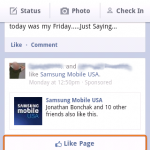This is probably the coolest thing I’ve ever seen printed in the News and Observer:
For the DIYer
Getting Started with Arduino Kit v3.0: $65
www.makershed.com/Getting_Started_with_Arduino_Kit_V3_0_p/msgsa.htm
The Arduino Starter Kit from Maker Shed is a gift beginners and pros both can appreciate. The kit opens the door to the popular microcontroller lauded by DIY computing geeks, and is designed as a companion to the “Getting Started with Arduino” book by Massimo Banzi, founder of the open source Arduino project. Some minor soldering is required for the power supply, but the other components plug into the board. This should make for some great parent-child team projects. Look out science fair.
BoingBoing also linked to a video made by Arduino cofounder Massimo Banzi explaining basic electronics. Arduino is one project I need to explore further!
via Holiday Gift Guide: Ideal gifts for the techie on your list – Life – NewsObserver.com.



